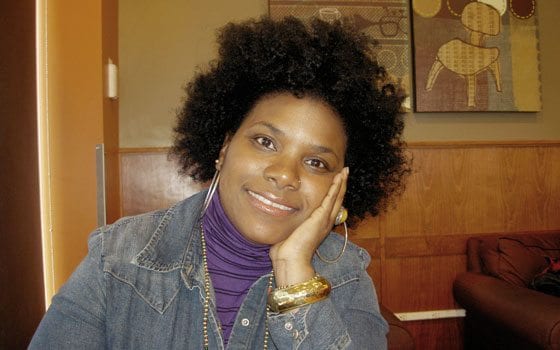

Author: Yvette ModestinIt takes a tenacious attitude to devote as much time and energy to advocating for others as Yvette Modestin does. Her friend Tony Van Der Meer, a professor at the University of Massachusetts, Boston, says her tenacity comes in part from her adherence to the Yoruba spiritual practice of Ifa.

Author: Margarita PersicoIt takes a tenacious attitude to devote as much time and energy to advocating for others as Yvette Modestin does. Her friend Tony Van Der Meer, a professor at the University of Massachusetts, Boston, says her tenacity comes in part from her adherence to the Yoruba spiritual practice of Ifa.
A difficult journey enables Yvette Modestin to help girls find themselves
Yvette Modestin remembers the feeling of isolation that came from claiming two cultures but being embraced by none.
Modestin came to Boston from her native Panama in the fall of 1986 to attend Emmanuel College, where she would pursue a degree in psychology. When she got here, she encountered something she never experienced back home — trouble fitting in.
Some Latinas she met didn’t acknowledge her presence because her skin was too dark.
“Pero tú eres negra,” she said the girls would tell her in Spanish. “But you are black.”
And even though her dark tone was closer to the blacks she encountered, they didn’t welcome her either, because she spoke Spanish.
Other people of dual African and Latin descent, or “Afro Latinos,” who have endured similar experiences in the U.S. have “decided to only live a black life,” according to Modestin. But she did not want to choose one aspect of herself over another, and she could not tolerate the racial injustice any more. So she decided to do something about it.
“My journey has changed,” Modestin says. “It started because of my own pain.”
In 2004, the pain led Modestin to found the organization Encuentro Diaspora Afro (EDA). Translated as “Gathering the African Diaspora,” the Roslindale-based grassroots organization aims to unite people of Afro Latin heritage like Modestin, who she said often feel disconnected from one another and from other members of the African diaspora in the U.S.
The organization also seeks to develop “bridges of understanding” between the Afro Latino and African American communities, to seek racial justice and to empower young Afro Latinos and Afro Latinas to seek leadership positions.
“If they start to see our commonalities, then we can see the power of us coming together,” said Modestin, 42.
Modestin experienced the power of community in her hometown of Colón, Panama. She grew up in Rainbow City, a sector of Colón with the largest African community in the country. She describes Rainbow City as her “village,” a place where everyone was related to some degree, or at least treated one another like they were.
Modestin’s mother died when she was 14, but she says her father, an aunt and the village raised her along with two other siblings. She had lots of love, she says, and was always reminded by her loved ones how pretty she was.
“I grew up in the most amazingly loving black community,” Modestin said, sporting a big smile. “So I did not have to look outside my immediate surroundings for support and visions of empowerment.”
That’s the kind of environment that Modestin wants to provide for young Afro Latinas. In 2007, she developed a curriculum for the Boston Public Schools under the EDA umbrella called “Hermanas Exchanging Roots,” or HER. The course, named after the Spanish word for “sisters,” educates young girls of dual African and Latin backgrounds about their African heritage.
“I want my young girls to see their strength,” said Modestin.
“The hope is that we will better prepare these girls to navigate their journey as black women in their society,” she added. “We walk both worlds.”
Funded by the Boston Women’s Fund, HER — a year-round program, now in its third cycle at Social Justice Academy in Hyde Park — brings girls together, usually meeting once a week, to discuss “issues such as history … leadership, body image, identity and violence,” as well as race and racism, according to Modestin. Perhaps just as important, the girls also learn how to relate to one another.
“The purpose of the project is to unite young women, address our identities and lives, and move toward positive change,” Modestin said. “The project begins the process of bridging differences among young women of color that would lead to the healing of our communities.”
Modestin said that the girls who participate often want more from the program, because it offers them a space where they can be their full self.
“I think they wanted more because … they just felt open enough to talk about certain things that they wouldn’t normally talk about,” said Taliah Curet, who is of Puerto Rican descent and served as a HER youth coordinator. “Nothing was off-limits, the topics were very broad; they all led back to the same roots of the problems and controversies in our society.”






